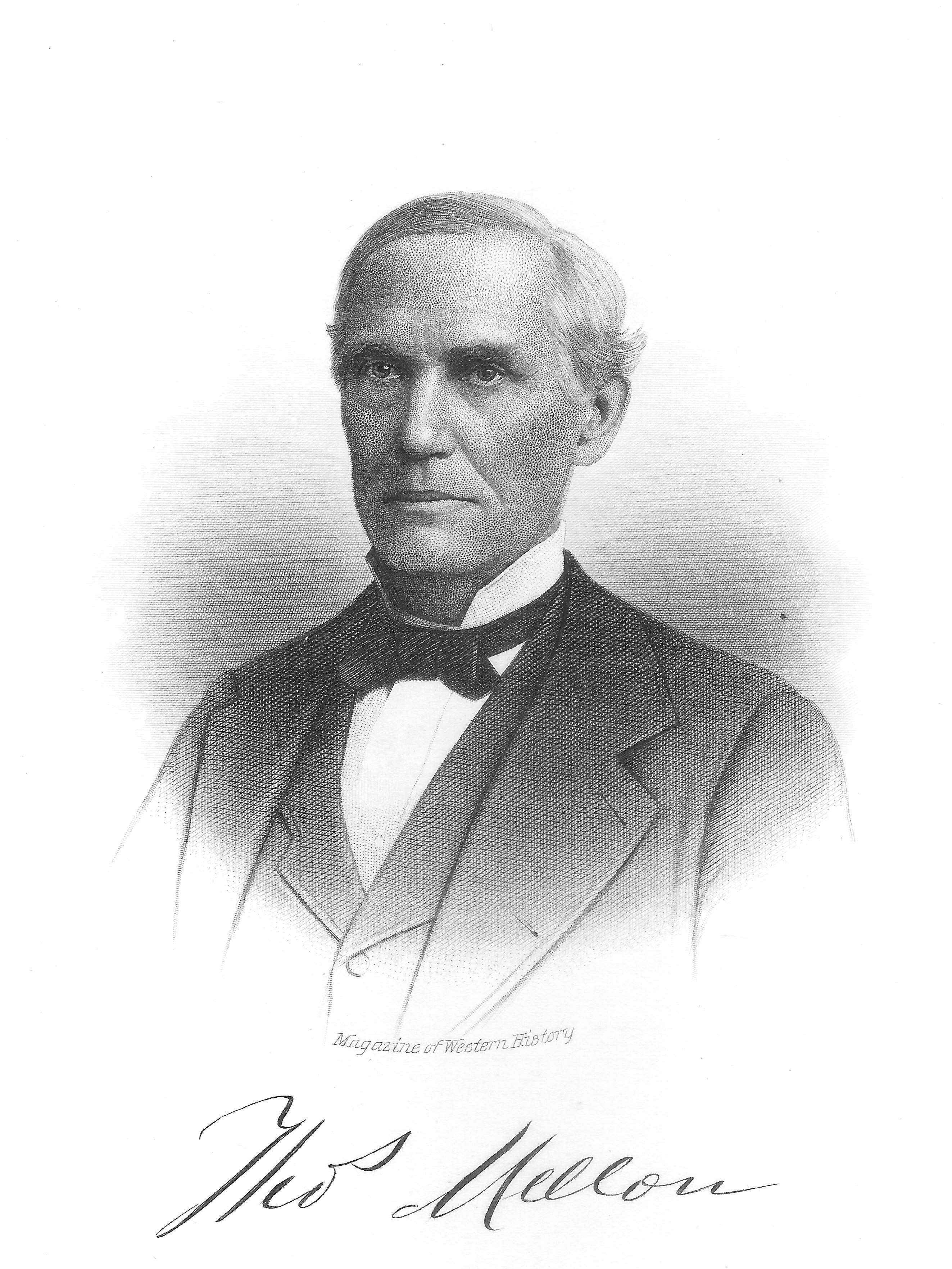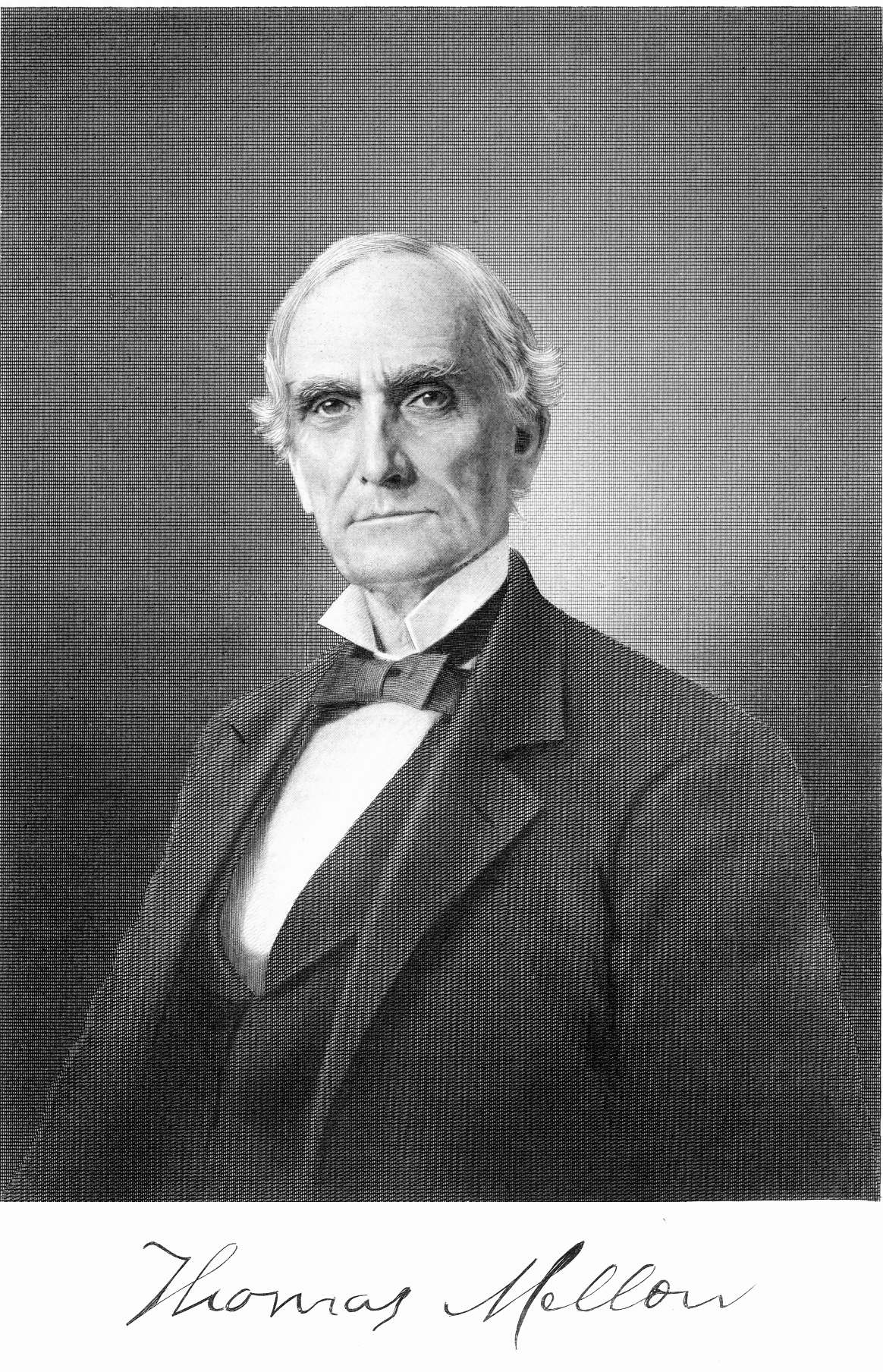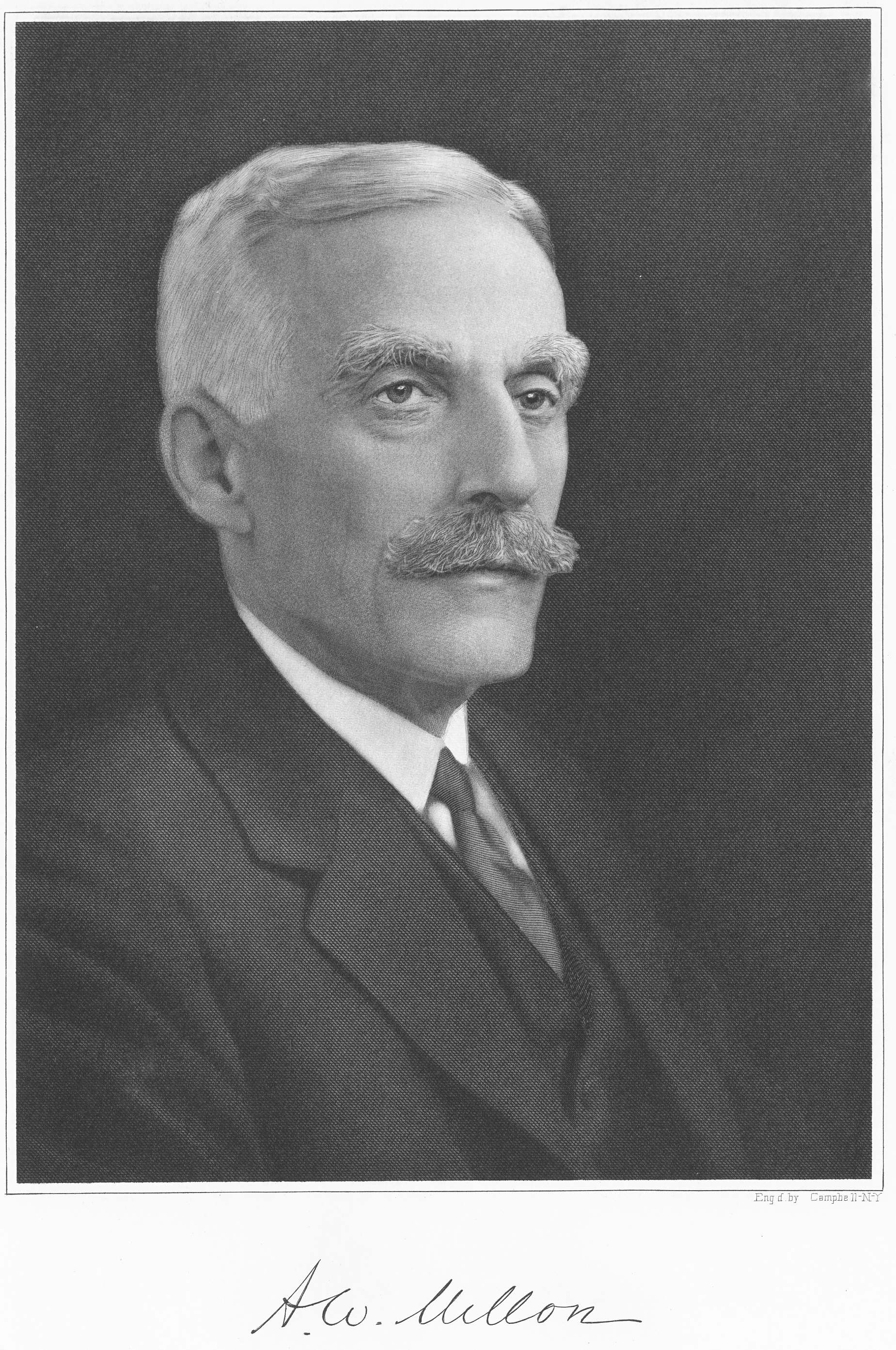Husband Judge Thomas Mellon 1 2 3 4 5 6 7 8

Born: 3 Feb 1813 - Parish Cappaigh, County Tyrone, Ireland 2 7 9 10
Christened:
Died: 3 Feb 1908 7 11
Buried:
Father: Andrew Mellon (Abt 1786-1856) 1 6 9
Mother: Rebecca Wauchob (Abt 1789-1868) 6 9
Marriage: 22 Aug 1843 5 12 13

• Additional Image: Thomas Mellon.
• Biographical Sketch: from Encyclopaedia of Contemporary Biography of Pennsylvania, Vol. 1 (New York: Atlantic Publishing & Engraving Co., 1889).
To read this brief biographical sketch of Judge Mellon, click here.
• Biographical Sketch: John W. Jordan, LL.D., Genealogical and Personal History of Western Pennsylvania (New York: Lewis Historical Publishing Company, 1915).
To read this brief biographical sketch of Judge Mellon, click here.
Wife Sarah Jane Negley 4 8 9 13 14 15
Born: 3 Feb 1817 - Pittsburgh, Allegheny Co, PA 7 15
Christened:
Died: 19 Jan 1909 7
Buried:
Father: Jacob Negley (1766-1826/1827) 16 17 18
Mother: Anna Barbara Winebiddle (1778-1867) 19
Children
1 M Thomas Alexander Mellon 5 11 12
Born:
Christened:
Died: Bef 1908
Buried:
Spouse: Mary Caldwell ( -Bef 1908) 5
2 M James Ross Mellon 4 5 7 11 12
Born:
Christened:
Died:
Buried:
Spouse: Rachel H. Larimer ( - ) 4 5 7
Marr: 1867 4
3 M Andrew William Mellon 5 7 8 11 12 20

Born: 24 Mar 1852 or 1855 - Pittsburgh, Allegheny Co, PA 20
Christened:
Died: 26 Aug 1937 8
Buried:
Spouse: Nora McMullen ( - ) 5 20
Marr: 1900 20
4 M Richard Beatty Mellon 5 11 12
Born:
Christened:
Died:
Buried:
Spouse: Jennie T. King ( - ) 5
5 M George Negley Mellon 5 11 12
Born: Abt 1860
Christened:
Died: 15 Sep 1887 5
Buried:
6 M Selwin Mellon 11
Born:
Christened:
Died:
Buried:
7 F Anna Rebecca Mellon 5 11
Born:
Christened:
Died: in childhood
Buried:
Spouse: Did Not Marry
8 F Sarah Emma Mellon 5 11
Born:
Christened:
Died: in childhood
Buried:
Spouse: Did Not Marry
General Notes: Husband - Judge Thomas Mellon
He was born at Camp Hill Cottage, on his father's farm, Lower Castletown, parish of Cappaigh, County of Tyrone, Ireland.
His ancestors on the father's side were from Scotland, on the mother's side they were Hollanders, farmers on both sides, who emigrated to the north of Ireland in the times of Cromwell and the Prince of Orange. They were noteworthy only for their thrift, industry and intelligence. Mr. Mellon's parents left Ireland and arrived in the United States in 1818, when he was but five years of age, and settled on a farm near Murrysville, Westmoreland County, Pennsylvania.
He learned to read at his mother's knee, and to her affectionate care and wise counsels he attributed in great measure whatever success in life he achieved. Until he reached the age of thirteen the only schooling he had was about four months each winter in the country school, as was the custom of that day in the rural districts. In his thirteenth year, however, his father allowed him a session at the Westmoreland county academy. Every county at that time had its academy, which then held the same relation to the common schools which the high-schools did later. The principal of the academy, Thomas Will, was a fine classical scholar, and instilled into his pupil higher aspirations than comported with the drudgery of the farm. And it was at the critical time when the important question-vitally important to every boy-pressed on him, the question of occupation for life. His father was decidedly in favor of farming. He considered it the occupation of all others most honorable and independent, as well as most useful, and prided himself on being able to give each of his children a farm when the time should come for starting them out for themselves. It was therefore painful to him to find his oldest son averse to his favorite theory. The son was loth to disappoint his father, however, and it was not until in his seventeenth year that a fixed determination was arrived at. In 1832 he entered the Latin school of Rev. Jonathan Gill, in his own neighborhood, his father having removed to Allegheny County. Here he prepared himself for college, but his time was divided between farm-labor and Latin grammar, committing to memory the rules of syntax while following the plow. And to this promiscuous kind of rugged mental and muscular training, which he received from childhood till nearly twenty-five years of age, he attributed his uniform good health through life and vigor of body and mind in his old age. In 1834 he entered the Western University of Pennsylvania, then in the imposing stone edifice on Fourth avenue which was destroyed by the great fire of 1845. The institution was in its prime, under the government of the celebrated scholar and educator, Robert Bruce, D. D. Here he soon found it so easy to keep up with his class that in order to gain time he entered as a law student in the office of Hon. Charles Shaler, the leading lawyer of the Pittsburgh bar at the time, and he was admitted to the practice of law shortly after he graduated from the college with the degree of Bachelor of Arts. He graduated in September, 1837, and was admitted to the bar in December, 1838. His rise at the bar was rapid, and the character of his practice of the best and most lucrative sort. The best evidence of this was the staying qualities of his clients. When he went on the bench twenty years afterward nearly all those of the business-men of the city who had become his clients were still such.
In 1843 he was united in marriage with a daughter of one of the early pioneers of the East End, and with her acquired an important addition to his increasing wealth; but the far more valuable fortune which she brought him were the sterling qualities of a good wife and mother. To union with her he attributed his great share of domestic happiness. The fruit of the marriage was eight children, four of whom were surviving in 1889.
In 1859 Mr. Mellon's law practice had become so onerous as to threaten his health, and his friends advised him to accept the nomination for judge of the common pleas court No. 1. He was nominated and elected, and took his seat on the bench on the 29th of December of that year. He filled the position with great satisfaction to the bar and the public to the end of the judicial term of ten years, and was urged to become a candidate for re-election, but he considered that to continue in office for another term would be too great a sacrifice of his private interests. Possessed of considerable estate, acquired by care and industry and judicious investments while at the bar, and the estate derived by his wife, he could not give his property the care and attention which it demanded so long as he remained on the bench, and besides he had at the time two sons fresh from school and verging into manhood who were urgent for employment in some regular business, and he desired to be with them, "their Mentor and Telemachus and ever-faithful friend." So he declined a renomination, and left the bench Dec. 29, 1869. Upon his retirement, the bar treated him to a sumptuous banquet, an honor before that time not conferred on a retiring judge of the lower courts. He did not go back to the bar, though he occasionally joined in the trial of suits where his own or the interests of his particular friends were involved; and in 1870 he established the banking-house of T. Mellon & Sons, which became one of the most substantial private banks of the city, and was under the management of his sons Andrew and Dick.
It could be said of Judge Mellon, what can be said of few others, that throughout his long life he never failed of success in any enterprise he ever seriously undertook. There are others who became suddenly possessed of greater wealth, but his fortune was the slow and steady growth of well-directed enterprise. In politics he was a republican, but never a zealous partisan, always voting for the candidates he deemed most deserving, and ever a vigorous opposer of bossism or ring-rule. In religion a Presbyterian, according to the faith of his fathers, but of rather more liberal views, holding the Bible in its present state to be incomplete; that the great first volume, the book of nature, is wanting and should be restored to its proper place in the estimation of the religious world; that nature was the first and always present and infallible revelation of God to man. Notwithstanding his burdensome professional and private labors, he was at all times a great reader, and kept abreast of the times in philosophy and literature of every substantial variety.